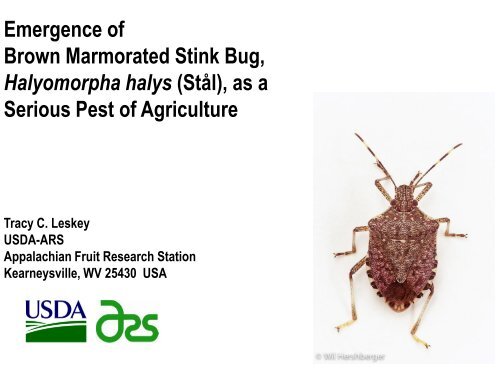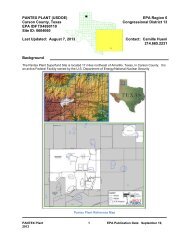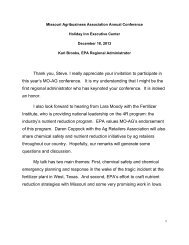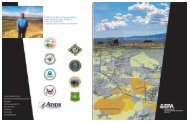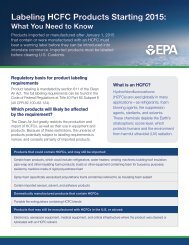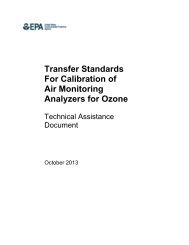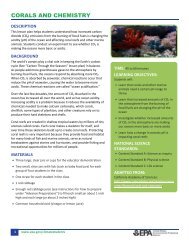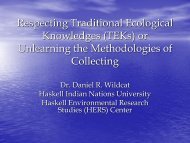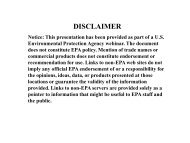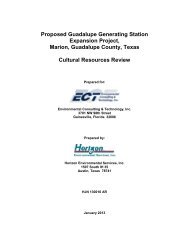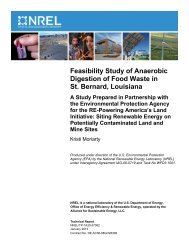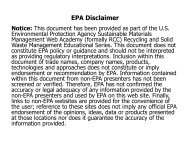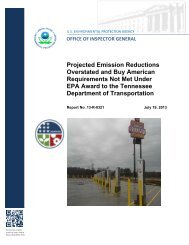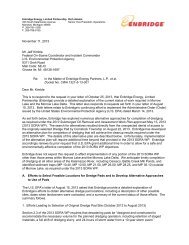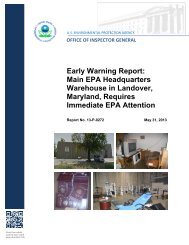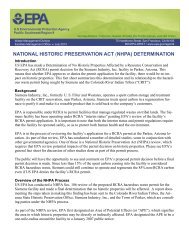Brown Marmorated Stink Bug, Halyomorpha halys (Stål), Status ...
Brown Marmorated Stink Bug, Halyomorpha halys (Stål), Status ...
Brown Marmorated Stink Bug, Halyomorpha halys (Stål), Status ...
You also want an ePaper? Increase the reach of your titles
YUMPU automatically turns print PDFs into web optimized ePapers that Google loves.
Emergence of<br />
<strong>Brown</strong> <strong>Marmorated</strong> <strong>Stink</strong> <strong>Bug</strong>,<br />
<strong>Halyomorpha</strong> <strong>halys</strong> (<strong>Stål</strong>), as a<br />
Serious Pest of Agriculture<br />
Tracy C. Leskey<br />
USDA-ARS<br />
Appalachian Fruit Research Station<br />
Kearneysville, WV 25430 USA
<strong>Brown</strong> <strong>Marmorated</strong> <strong>Stink</strong> <strong>Bug</strong> is an Invasive Species<br />
Native to China,<br />
Japan, Korea, and<br />
Taiwan.
<strong>Brown</strong> <strong>Marmorated</strong> <strong>Stink</strong> <strong>Bug</strong> Life History<br />
Egg Mass<br />
1 st<br />
2 nd 3 rd 4 th 5 th<br />
• Deposit eggs on undersides of leaves. Five<br />
nymphal stages. Two generations per year in<br />
much of the mid-Atlantic. Developmental<br />
period lasts ~50d from egg to adult.<br />
• 300+ host plants including tree fruit, small<br />
fruit, grapes, vegetables, legumes, and<br />
ornamentals.<br />
Adult<br />
Male<br />
Adult<br />
Female
History of BMSB in the United States<br />
Introduced<br />
into USA?<br />
First<br />
suspected<br />
specimens<br />
collected in<br />
Allentown, PA<br />
First properly<br />
identified<br />
specimen in the<br />
USA. Collected<br />
in Allentown, PA<br />
First confirmed<br />
MD specimen<br />
Hagerstown, MD<br />
First<br />
confirmed<br />
NJ<br />
specimen<br />
First confirmed<br />
WV specimen<br />
Falling Waters,<br />
WV<br />
Localized reports of<br />
injury in Allentown area<br />
Severe crop injury in<br />
WV, MD, NJ, DE, VA and<br />
PA in tree fruit, small<br />
fruit, vegetables, row<br />
crops, and vineyards.<br />
Serious late season<br />
injury in tree fruit<br />
observed in WV<br />
First reports of late<br />
season injury in<br />
tree fruit in WV<br />
Season-long pressure<br />
throughout the region.<br />
Aggressive chemicallybased<br />
management<br />
programs undertaken.<br />
1996 1997 1998 1999 2000 2001 2002 2003 2004 2005 2006 2007 2008 2009 2010 2011
Current Distribution of BMSB in the United States<br />
Severe Agricultural and Nuisance Problems Reported<br />
Nuisance Problems Only<br />
Detected
First Maryland BMSB Specimen<br />
Collected October 8, 2003<br />
Shell Service Station and Snax Store, Hagerstown, MD
Increasing Populations of BMSB<br />
2007-2010
2008-2009 Late Season Problems<br />
• 1,100 acre<br />
commercial fruit<br />
orchard that<br />
produces 500,000<br />
bushels of fruit<br />
annually.<br />
• In 2009, nearly 10%<br />
of all fruit harvested<br />
redirected from fresh<br />
market to processing<br />
due to BMSB injury.<br />
• Loss in value can<br />
reach 80-90%.
Large Overwintering Population, Eastern Panhandle, WV.<br />
Fall 2009
Winter 2010
BMSB Early Season Activity<br />
April – June 2010<br />
• BMSB spotted in our<br />
experimental<br />
orchards by late<br />
April.<br />
• Began photographing<br />
BMSB during the<br />
early season to<br />
document the<br />
presence of adult<br />
activity.<br />
Montmorency Cherry<br />
May 5, 2010
Loring Peach (20 mm Fruit)<br />
May 10, 2010
Seckel Pear<br />
June 10, 2010
Appearance of BMSB Injury in Stone Fruit<br />
Late June – Mid July 2010
Adult and Nymphal Feeding on Peach<br />
July 21, 2010
July 29, 2010
July 29, 2010<br />
Total loss of blocks of<br />
early-season<br />
stone fruit emerging<br />
throughout the<br />
region.
Adult and Nymphal Feeding on Corn<br />
August 3, 2010
Adult and Nymphal Feeding on Tomato Early-Mid August 2010<br />
Photos courtesy of Clarissa Mathews, Shepherd Univ. and Ames Herbert, VA Tech.
Adult and Nymphal Feeding on Pepper Early-Mid August 2010<br />
Photos courtesy of Ames Herbert, VA Tech.
Raspberries Mid August 2010 Photos Courtesy of Bryan Butler and Doug Pfeiffer<br />
• Fruit feeding by nymphs and adults.<br />
• Severe feeding leads to shriveled fruit that does not come free from the receptacle.<br />
• Those with less severe injury to druplets left unmarketable.
Adult and Nymphal Feeding on Soybean Mid August 2010<br />
BMSB Injury<br />
Photo courtesy of Stan Fultz<br />
Unaffected
August 26, 2010 Late-Season Injury on Apple
Ornamentals, Nursery Crops, and Non-Bearing<br />
Photo courtesy of Kim Hoelmer<br />
Fruit Trees
BMSB in Grape Early September 2010<br />
Photos courtesy of Doug Pfeiffer<br />
Photo courtesy of Dean Polk
Hazelnuts Photo courtesy of Peter Shearer
Post-Harvest Issues<br />
No sign of injury when put into cold storage,<br />
but ~4-5 weeks later BMSB injury apparent.
Documenting the Scale of the Threat<br />
Posed by BMSB to Tree Fruit<br />
• Conducted a damage survey<br />
in commercial apple and<br />
peach orchards in WV and<br />
MD.<br />
• Develop a repeatable method<br />
for assessing total amount<br />
and severity of injury to stone<br />
and pome fruit.<br />
• Survey from mid-July to<br />
harvest.
Damage Survey
% Fruit Injury<br />
100<br />
90<br />
80<br />
70<br />
60<br />
50<br />
40<br />
30<br />
20<br />
10<br />
0<br />
BMSB Feeding Injury—Rate and Severity<br />
Regional Commercial Peach Orchards<br />
2010 Growing Season<br />
Severity 3.71<br />
Economic<br />
Injury<br />
Perimeter Interior<br />
Orchard Sample Location<br />
Severity 3.51
% Fruit Injury<br />
100<br />
90<br />
80<br />
70<br />
60<br />
50<br />
40<br />
30<br />
20<br />
10<br />
0<br />
BMSB Feeding Injury—Rate and Severity<br />
Regional Commercial Apple Orchards<br />
2010 Growing Season<br />
Severity = 4.26<br />
Economic<br />
Injury<br />
Perimeter Interior<br />
Orchard Sample Location<br />
Severity = 3.11<br />
2010 economic loss in mid-Atlantic apples due to BMSB feeding<br />
estimated at 37 million dollars (US Apple Association)
http://www.northeastipm.org/working-groups/bmsbworking-group/
One Homeowner’s Plight<br />
“This weekend I vacuumed up more than 8,000 stink bugs (vast majority<br />
were alive) in my attic, to add to the now more than 4,000 I’ve removed<br />
from my living space since 1/1/2011. I have now destroyed 12, 348 stink<br />
bugs in my home in 45 days since January 1, 2011.<br />
After all the effort this weekend, another 100+ found their way into my<br />
kitchen (a two year old addition) Sunday afternoon.” (mid-Feb, Resident<br />
near Harpers Ferry, WV)
Challenges in Managing BMSB in<br />
Commercial Plantings<br />
• Tremendous season-long pressure from populations moving from wild and other<br />
cultivated hosts into cropped areas leading to constant re-infestation of plots.<br />
• Greatest efficacy observed when adults have direct contact with finished wet spray<br />
material. Only a small portion of damaging population likely exposed to this material.<br />
• Avoidance behaviors allow them to potentially escape treatments.<br />
• Insecticides labeled as excellent against native SBs not showing same field efficacy<br />
against BMSB. Knock down and recovery observed in grower orchards. Other<br />
materials completely ineffective.<br />
• Section 18 Working Group. Fall-Winter laboratory-based insecticide trials by many<br />
cooperating institutions.
Laboratory-Based BMSB Insecticide Evaluations<br />
• Because of the constant (season-long) pressure from BMSB populations located<br />
outside orchards and other cropped areas, BMSB continuously re-infests plots.<br />
• Thus, immigrating BMSB are unlikely to encounter direct contact with finished (wet)<br />
spray material.<br />
• This population poses the primary threat to crops. Control depends on residual<br />
effectiveness and likelihood of uptake.<br />
• Laboratory insecticide trials designed to be biologically relevant and based on control<br />
of this primary threat.
2<br />
Experimental Trials<br />
Direct observations of vertical movement<br />
capacity following insecticide exposure.<br />
3<br />
1<br />
EthoVision trials for measuring<br />
horizontal mobility in no-choice<br />
insecticide-treated surfaces for 4.5h.<br />
Mortality tracked for 7-d followed by<br />
final vertical movement trial.
Water<br />
(Control)<br />
505 microliters<br />
per arena<br />
Warrior<br />
(Pyrethroid)<br />
1.0 fl. oz.<br />
per 100 gallons<br />
BMSB Insecticide Evaluations<br />
Sample Tracks<br />
0 Hours Exposure<br />
Track 00006<br />
94.11 cm<br />
145.31 sec<br />
0 Hours Exposure<br />
Track 00073<br />
147.78 cm<br />
343.34 sec<br />
1 Hour Exposure<br />
Track 00029<br />
121.00 cm<br />
125.13 sec<br />
1 Hour Exposure<br />
Track 00098<br />
42.34 cm<br />
79.41 sec<br />
2 Hours Exposure<br />
Track 00064<br />
53.68 cm<br />
105.11 sec<br />
2 Hours Exposure<br />
Track 00117<br />
0.54 cm<br />
0.83 sec
BMSB Insecticide Evaluations<br />
7-Day Survivorship
% Adult BMSB/Category<br />
% Adult BMSB/Category<br />
Glass<br />
100%<br />
90%<br />
80%<br />
70%<br />
60%<br />
50%<br />
40%<br />
30%<br />
20%<br />
10%<br />
0%<br />
100%<br />
Glass<br />
90%<br />
80%<br />
70%<br />
60%<br />
50%<br />
40%<br />
30%<br />
20%<br />
10%<br />
0%<br />
Time-Phased BMSB Condition<br />
4.5-Hour Exposure Period In Glass Arenas<br />
Methomyl (Lannate SP) @ 1.0 lb/100 gal<br />
0 1 2 3 4 5 6 7<br />
Days After Exposure<br />
Time-Phased BMSB Condition<br />
4.5-Hour Exposure Period In Glass Arenas<br />
Permethrin (Permethrin 3.2 EC) @ 16.0 oz/100 gal<br />
0 1 2 3 4 5 6 7<br />
Days After Exposure<br />
Promising Compounds<br />
Lannate<br />
% Alive<br />
% Moribund<br />
% Dead<br />
Permethrin<br />
Alive<br />
Moribund<br />
Dead<br />
% Adult BMSB/Category<br />
% Adult BMSB/Category<br />
100%<br />
90%<br />
80%<br />
70%<br />
60%<br />
50%<br />
40%<br />
30%<br />
20%<br />
10%<br />
Glass<br />
0%<br />
Glass<br />
100%<br />
90%<br />
80%<br />
70%<br />
60%<br />
50%<br />
40%<br />
30%<br />
20%<br />
10%<br />
0%<br />
Time-Phased BMSB Condition<br />
4.5-Hour Exposure Period In Glass Arenas<br />
Dinotefuran (Safari 20 SG) @ 16 oz/100 gal<br />
0 1 2 3 4 5 6 7<br />
Days After Exposure<br />
Time-Phased BMSB Condition<br />
4.5-Hour Exposure Period In Glass Arenas<br />
Endosulfan (Thiodan EC) @ 1.67 pts/100 gal<br />
0 1 2 3 4 5 6 7<br />
Days After Exposure<br />
Safari<br />
Alive<br />
Moribund<br />
Dead<br />
Thiodan<br />
Alive<br />
Moribund<br />
Dead
% Adult BMSB/Category<br />
% Adult BMSB/Category<br />
Glass<br />
100%<br />
90%<br />
80%<br />
70%<br />
60%<br />
50%<br />
40%<br />
30%<br />
20%<br />
10%<br />
0%<br />
Glass<br />
100%<br />
90%<br />
80%<br />
70%<br />
60%<br />
50%<br />
40%<br />
30%<br />
20%<br />
10%<br />
0%<br />
Time-Phased BMSB Condition<br />
4.5-Hour Exposure Period In Glass Arenas<br />
Phosmet (Imidan 70-W) @ 4.0 lbs/100 gal<br />
0 1 2 3 4 5 6 7<br />
Days After Exposure<br />
Time-Phased BMSB Condition<br />
4.5-Hour Exposure Period In Glass Arenas<br />
Cyfluthrin (Tombstone 2.0 EC) (1-Day) @ 2.6 oz/100 gal<br />
0 1 2 3 4 5 6 7<br />
Days After Exposure<br />
Weaker Materials<br />
Imidan<br />
Alive<br />
Moribund<br />
Dead<br />
Tombstone<br />
Alive<br />
Moribund<br />
Dead<br />
% Adult BMSB/Category<br />
% Adult BMSB/Category<br />
100%<br />
90%<br />
80%<br />
70%<br />
60%<br />
50%<br />
40%<br />
30%<br />
20%<br />
10%<br />
Glass<br />
0%<br />
Glass<br />
100%<br />
90%<br />
80%<br />
70%<br />
60%<br />
50%<br />
40%<br />
30%<br />
20%<br />
10%<br />
0%<br />
Time-Phased BMSB Condition<br />
4.5-Hour Exposure Period In Glass Arenas<br />
Acetamiprid (Assail 30 SG) @ 8.0 oz/100 gal<br />
0 1 2 3 4 5 6 7<br />
Days After Exposure<br />
Time-Phased BMSB Condition<br />
4.5-Hour Exposure Period In Glass Arenas<br />
Oxamyl (Vydate L) @ 3.0 pts/100 gal<br />
Assail<br />
0 1 2 3 4 5 6 7<br />
Days After Exposure<br />
Vydate<br />
Alive<br />
Moribund<br />
Dead<br />
Alive<br />
Moribund<br />
Dead
Lethality Index =<br />
BMSB Toxicity Testing<br />
Lethality Index<br />
Ʃ Day 0-7 Ʃ Day 0-7 Ʃ Day 0-7<br />
[(BMSB Alive x 0.0) + (BMSB Moribund x 0.5) + (BMSB Dead x 1.0)]<br />
240<br />
x 100<br />
The maximum value of the Lethality Index for each material is 100.0; the minimum value is 0.0,<br />
and compounds are ranked in descending order of value.<br />
* After testing ~45 materials, the Lethality Index was modified to accommodate four conditional<br />
categories: Alive (0.0); Affected (0.25); Moribund (0.75); and Dead (1.0). This change in conditional<br />
interpretation does not change the comparability of Lethality Index across tested materials.
BMSB Toxicity Testing<br />
Lethality Index<br />
Active<br />
Trade Lethality Active<br />
Trade Lethality<br />
Ingredient<br />
Name Index Ingredient Name Index<br />
Chlorpyrifos/Gamma-Cyhalothrin Cobalt 95.4 Oxamyl Vydate 46.8<br />
Dimethoate Cygon 93.3 MBI-203 MBI-203 43.4<br />
Malathion Malathion 92.5 Esfenvalerate Asana 43.3<br />
Bifenthrin Brigade 91.5 Imidacloprid Provado 40.0<br />
Endosulfan Thionex 90.4 Tolfenpyrad SC Tolfenpyrad SC 36.5<br />
Methidathion Supracide 90.4 MBI-205 MBI-205 35.7<br />
Methomyl Lannate 90.1 Tolfenpyrad EC Tolfenpyrad EC 33.3<br />
Chlorpyrifos Lorsban 89.0 Pyrifluquinazon Pyrifluquinazon 28.3<br />
Acephate Orthene 87.5 Kaolin Clay Surround 23.1<br />
Fenpropathrin Danitol 78.3 Diazinon Diazinon 20.4<br />
Permethrin Permethrin 77.1 Phosmet Imidan 20.0<br />
Azinphosmethyl Guthion 71.3 Acetamiprid Assail 18.8<br />
Dinotefuran Safari 67.3 Thiacloprid Calypso 18.3<br />
Kaolin Clay/Thiamethoxam Particle Delivery 66.7 Abamectin Agri-Mek 16.3<br />
Formetanate HCl Carzol 63.5 Indoxacarb Avaunt 11.3<br />
Gamma-Cyhalothrin Proaxis 59.0 Spirotetramat Movento 9.8<br />
Zinc Dimethyldithiocarbamate Ziram 57.5 Carbaryl Sevin 9.2<br />
Thiamethoxam Actara 56.3 Water Control 6 9.2<br />
Clothianidin Clutch 55.6 Flonicamid Beleaf 7.7<br />
Beta-Cyfluthrin Baythroid 54.8 Water Control 2 6.9<br />
Lambda-Cyhalothrin Warrior 52.9 Water Control 3 6.3<br />
Zeta-Cypermethrin Mustang Max 52.1 Water Control 5 6.0<br />
Cyfluthrin Tombstone 49.0 Water Control 4 4.2<br />
MBI-206 MBI-206 48.4 Cyantraniliprole Cyazypyr 1.7
Monitoring BMSB Threat in Commercial Orchards<br />
in 2011<br />
Nob Hill<br />
Edgemont<br />
Orchards
Growers Dealt With Threat With Threat With<br />
Aggressive Insecticide Programs<br />
• The single most important pest growers attempted to<br />
manage was BMSB.<br />
• Growers used broad-spectrum insecticides against<br />
BMSB.<br />
• Growers treated much more frequently. Often 2-4x more<br />
applications than in prior years.<br />
• Growers treated areas outside orchards (bordering wood<br />
lots and hedgerows).<br />
• If a grower began to ease up, increases in injury soon<br />
were detected.
Impact of Aggressive Insecticide Programs<br />
• Costs are up tremendously. Costs include materials<br />
(insecticides, fuel, spray equipment) and labor.<br />
• Growers are relying on materials that are slated for<br />
cancellation.<br />
• Integrated Pest Management (IPM) programs have been<br />
devastated because of need for broad spectrum<br />
insecticides. Secondary pest problems are requiring<br />
treatment.<br />
• This approach is not sustainable.
High<br />
Moderate<br />
Low<br />
BMSB Threat To Apples<br />
Feeding on Fruit Results<br />
in Nominal Injury, but<br />
Reproduction Can Occur if<br />
Invading Populations Not<br />
Managed<br />
Unmanaged Threat<br />
Feeding on Fruit<br />
Results in<br />
Economic Injury<br />
Maturing Fruit<br />
Becomes Increasingly<br />
Attractive To BMSB.<br />
Fewer other hosts<br />
available.<br />
Increasing Populations of<br />
BMSB from other hosts<br />
(Overlap of Multiple<br />
Generations)<br />
J F M A M J J A S O N D
Early Season Superficial Injury Early season feeding results in nominal injury with discolored dot and feeding sheath beneath<br />
Mid-Season Economic Injury Mid season feeding results in possible discolored depressions and flesh surrounding feeding sheath appearing corky<br />
Mid-Late Season Economic Injury Mid-late season feeding results in discolored depressions with larger, corky areas in flesh
% Fruit Injury<br />
70<br />
60<br />
50<br />
40<br />
30<br />
20<br />
10<br />
0<br />
Monitored Orchard MD-2<br />
Destructive Fruit Sampling (Apple)<br />
Presence of Feeding Injury/Corking<br />
29-Apr<br />
6-May<br />
13-May<br />
20-May<br />
27-May<br />
3-Jun<br />
10-Jun<br />
17-Jun<br />
24-Jun<br />
1-Jul<br />
8-Jul<br />
15-Jul<br />
22-Jul<br />
29-Jul<br />
5-Aug<br />
12-Aug<br />
19-Aug<br />
26-Aug<br />
2-Sep<br />
9-Sep<br />
16-Sep<br />
23-Sep<br />
30-Sep<br />
% Feeding Sites<br />
Sample Date<br />
Peripheral Zone Interior Zone
Differential Harvest Has Been Necessary<br />
Losses of 5-15% being reported so far.
Development of Effective Monitoring Traps<br />
• Presence, abundance, and<br />
seasonal activity of BMSB.<br />
• Growers can make<br />
informed management<br />
decisions.<br />
• Four key components<br />
– Olfactory cues<br />
– Visual cues<br />
– Capture mechanism<br />
– Deployment strategy
Black Green Yellow White<br />
Clear<br />
Trunk<br />
Mimic<br />
Foliar<br />
Stimulus<br />
Visual Cues<br />
Foliar<br />
Stimulus<br />
• Responses to visual stimuli associated with trap bases.<br />
• Baited with methyl (2E, 4E, 6Z)-decatrienoate or left unbaited.<br />
• Traps deployed at the periphery of orchards blocks<br />
Unapparent<br />
Stimulus<br />
• Captures from October 7-November 17, 2009 and July 23-October 14, 2010.<br />
Unapparent<br />
Stimulus
Mean No. SBs Per Trap<br />
450<br />
400<br />
350<br />
300<br />
250<br />
200<br />
150<br />
100<br />
50<br />
0<br />
a<br />
Greatest Adult and Nymphal Captures in Baited Traps<br />
with Dark Visual Base<br />
2009 Adult Captures BLACK<br />
250<br />
2010 Adult Captures<br />
GREEN<br />
WHITE<br />
200<br />
a<br />
b<br />
CLEAR<br />
a<br />
b<br />
b<br />
BAITED UNBAITED<br />
Mean Number of Nymphs Per Sample<br />
c<br />
500<br />
400<br />
300<br />
200<br />
100<br />
0<br />
c c c<br />
a<br />
ab<br />
abc<br />
bc<br />
bc<br />
150<br />
100<br />
50<br />
2010 Nymphal Captures<br />
Mean Number of Adults Per Sample<br />
bc<br />
bc<br />
bc<br />
Baited Unbaited<br />
0<br />
ab<br />
Baited Unbaited<br />
Black<br />
Yellow<br />
Green<br />
White<br />
Clear<br />
c<br />
ab<br />
c<br />
ab<br />
b b b b<br />
Green<br />
Black<br />
Yellow<br />
Clear<br />
White<br />
b
Our Only Attractant Fails During the Early- and Mid-Season<br />
Methyl (2E,4E,6Z)-decatrieonate attractive to adults only during<br />
the late-season. Confirmed in MD, NJ, PA, VA, WV and other<br />
states in 2011 not attractive in early season, despite reports in<br />
Asian literature.
How Can We Improve our Monitoring Traps<br />
• Integrate Optimized Olfactory Stimuli<br />
– A season-long olfactory attractant for BMSB.<br />
– Identification of a potential male-produced aggregation pheromone.<br />
• Integrate Visual Stimuli<br />
– Observations of attraction to UV and visible light.<br />
– Optimized and specific wavelengths and intensity.
Progress Toward Identification of<br />
BMSB Aggregation Pheromone
Mean No. Per Trap<br />
Early Season Trial Indicates Promising Activity<br />
10<br />
8<br />
6<br />
4<br />
2<br />
0<br />
13-24 May 2011<br />
#2 #5 #6 Unbaited<br />
Treatment
Mean No. Per Trap<br />
20<br />
15<br />
10<br />
5<br />
0<br />
Two Treatments Show Significant<br />
ab<br />
Behavioral Activity<br />
27 May-24 June 2011<br />
a<br />
#2 #6 #7 Unbaited<br />
Treatment<br />
b b<br />
Traps baited with #6 capture ~4x more than control
#6 and #2 Continue to Demonstrate Significant Activity<br />
Mean No. Per Trap<br />
20<br />
15<br />
10<br />
5<br />
0<br />
ab<br />
8 July - 2 August 2011<br />
a<br />
#2 #6 #8 Unbaited<br />
Treatment<br />
Traps baited with #6 capture ~6x more than control<br />
b<br />
b
Mean No. Per Trap<br />
Several Treatments Demonstrate Significant Activity<br />
200<br />
150<br />
100<br />
50<br />
0<br />
b<br />
12 August - 6 September 2011<br />
a<br />
a a<br />
#1 #2 #6 #9 Unbaited<br />
Treatment<br />
Traps baited with #2,6 and 9 capture ~6x more than control<br />
b
Captures in Traps Baited With #10 Significantly Greater<br />
Mean No. Per Trap<br />
1000<br />
800<br />
600<br />
400<br />
200<br />
0<br />
b<br />
9-30 September 2011<br />
b<br />
b<br />
#2 #6 #9 #10 Unbaited<br />
Treatment<br />
Traps baited with #10 captured ~15x more than control and<br />
~3-4x more than other treatments.<br />
a<br />
b
Mean No. Per Trap<br />
35<br />
30<br />
25<br />
20<br />
15<br />
10<br />
5<br />
0<br />
Significant Dose-Response Detected<br />
a<br />
7-20 October 2011<br />
b<br />
48 mg 8 mg 2 mg Unbaited<br />
Dose Treatment<br />
b<br />
b
• Documenting early-season<br />
attraction to #10.<br />
• Formulation, utility and<br />
commercialization.<br />
• Behavior, biology, and<br />
ecology.<br />
What’s Next?
Visual Cues<br />
Identifying Optimal Wavelengths and Intensities of Light
Traps Augmented With Light-Based Stimuli Captured<br />
13, 457 Adult BMSB in ~6 Weeks During Late Summer<br />
Mean No. Per Trap<br />
2000<br />
1800<br />
1600<br />
1400<br />
1200<br />
1000<br />
800<br />
600<br />
400<br />
200<br />
0<br />
a<br />
ab<br />
ab<br />
bc<br />
#1 #2 #3 #4 #5 #6 Unbaited<br />
Treatment<br />
c<br />
c c
• Documenting early-season<br />
attraction to light-based<br />
stimuli.<br />
• Formulation, utility and<br />
commercialization.<br />
• Behavior, biology, and<br />
ecology.<br />
What’s Next?
BMSB is a Landscape-level Threat<br />
Invasive Tree-of-Heaven Native Woody Hosts<br />
Apple<br />
Corn
Long-Term Solutions<br />
Strategies To Reduce Populations Across Entire Landscape
Current Research and Collaborations<br />
• We have formed a nationwide team of over 50<br />
research and Extension professionals representing 14<br />
institutions in 10 states.<br />
• USDA-NIFA Specialty Crop Research Initiative,<br />
entitled “Biology, Ecology, and Management of <strong>Brown</strong><br />
<strong>Marmorated</strong> <strong>Stink</strong> <strong>Bug</strong> in Orchard Crops, Small Fruit,<br />
Grapes, Vegetables, and Ornamentals” funded in<br />
2011.<br />
• BMSB will require a sustained cooperative,<br />
collaborative, and integrated approach for research<br />
and Extension on a national scale.
Acknowledgements<br />
• USDA-ARS, NIFA Critical Issues Grant # 2010-37610-21845, USDA-APHIS, and the Maryland State Horticultural Society<br />
Doo-Hyung Lee<br />
Starker Wright<br />
Torri Hancock<br />
Sean Wiles<br />
Cameron Scorza<br />
Brent Short<br />
John Cullum<br />
Rebecca Posa


